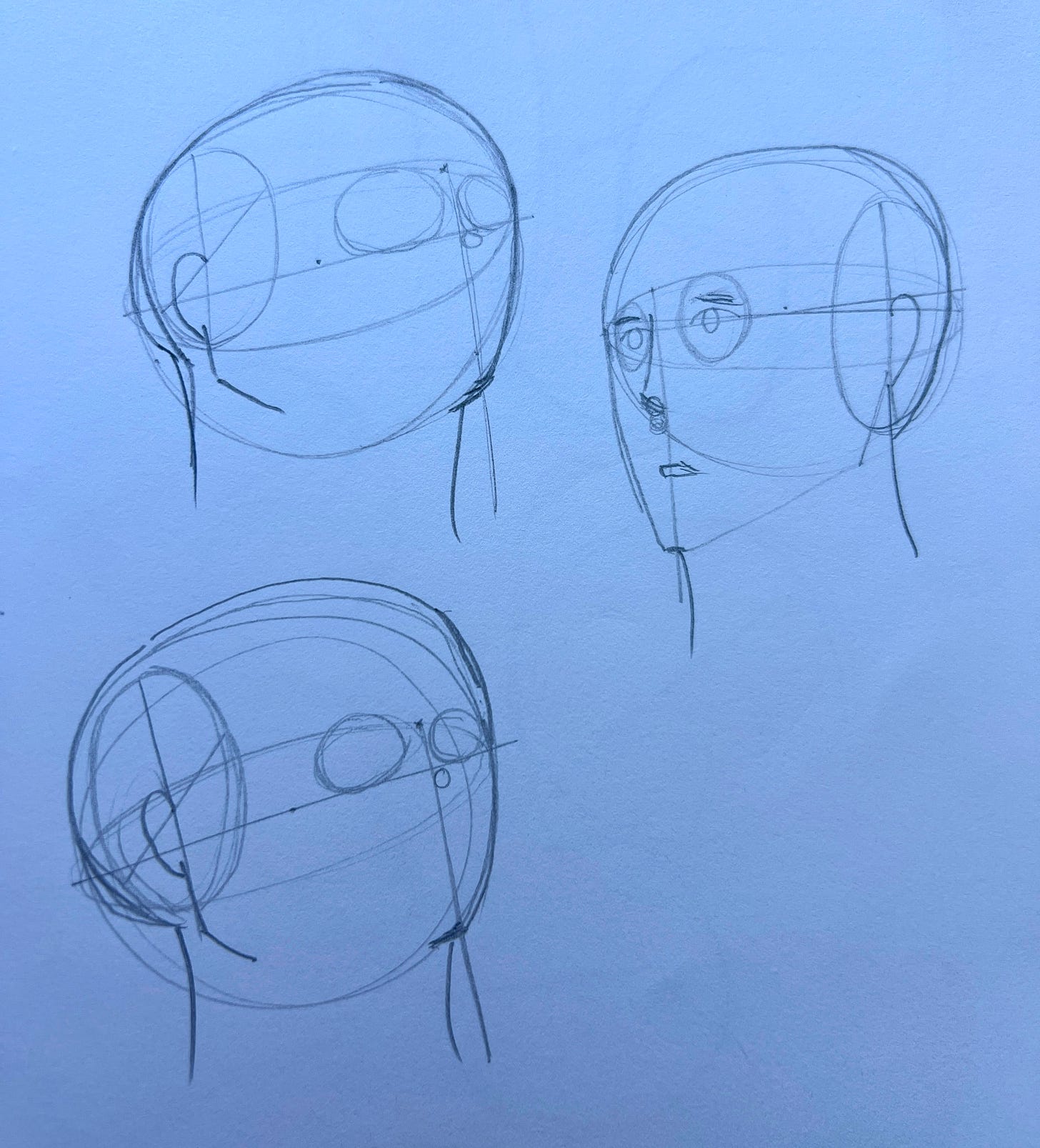I sat in a cafe planning to write a piece on our ego’s three favorite defense mechanisms. However, the scene in front of me deserved - no, it required - I put my current writing aside and share this insight.
At the table across from me, a girl is sitting with a sketchbook and a set of pencils. She’s drawing the scene outside the window.
The cafe we’re in connects to a large bookstore positioned at one of the busiest roundabouts in the city. A quiet space surrounded by books looking out at a chaotic yet functional stampede of bikes and cars.
I’ve always admired people who can transfer a scene from their eyes or minds onto paper. I’ve been jealous of them, in a healthy amount. But seeing her is even more intriguing to me now than it would’ve been before. That’s because I’ve been learning to draw over the past few months. Admittedly, most of my recent drawing sessions have been 5-10 minutes long. The drawing I shared in my last existential espresso probably shows that not much progress has been made. But it’s better than nothing. In fact, that’s the whole philosophy behind my consistency method. When too busy or facing any other obstacle that would otherwise prevent me from practicing my chosen habit, I engage in it on a minimal level that maintains psychological momentum even if it doesn’t produce impressive external results.
But back to the main scene. Because drawing isn’t anymore something I’m just admiring from afar but also something I’m trying to do myself, I stopped writing for a moment and observed her drawing. Then I had a brilliant idea.
“There is an art book section in the bookstore. Maybe I should approach the girl and ask for some drawing advice and a drawing book recommendation.”
As someone who’s been writing consistently for five and a half years, I should’ve known better. And I did snap out of it almost instantly. I remembered this is yet another example of the human tendency to try to postpone or find a way around the only thing that matters: putting in the work.
My very first sketchbook isn’t full yet. What advice could she possibly give me other than to practice more? And I know very well another book isn’t what I need. Sure, there are books that have information on how to draw a more realistic still life or more precise hands and feet. But am I at the point of perfecting my skill in that specific way? No. I must recognize I’m in the early stages where the only thing that matters and makes sense is to put in the reps, no matter how ugly they are.
What stage of your journey are you at? Did you fill out your first sketchbook? How many hours of deliberate practice did you log in? Did you even start?
I often get messages from people asking if I have any writing advice because they want to share their ideas with the world. In some cases, they haven’t even started writing yet. More often, they wrote and published a handful of online posts. What advice could I possibly give other than write more?
To the person on the receiving end, it might seem like I’m too lazy to give them more specific advice. But it’s only when you’ve been doing something for a long time that you realize the only advice that matters is to do more of the thing.
Furthermore, you need to accumulate your own mistakes for someone to be able to give you personalized, specific advice. And you need to put in the reps to accumulate mistakes. Therefore, the more reps you put in, the more relevant and helpful advice you can receive.
However, it seems most humans are plagued by the tendency to avoid work by staying stuck in the “learning” phase. That friend who bought three different coding courses but hasn’t yet tried to write a single line of code. That colleague who reads about “the best training program” every day but works out once every ten days. Obviously, I’m not immune to this self-sabotaging pattern either. I only got better at catching it early on.
What is needed for you to break free is brutal self-honesty. If you don’t keep this tendency in check, you will spend months, if not years, “learning” about the thing and collecting insights on it without moving an inch forward.
To know if you're in the avoidance trap, ask yourself:
Is my current obstacle not getting enough outside advice or not having done enough work to collect personally relevant feedback? How many hours do I dedicate to this activity per week? Do I more often feel tired from too much practice or guilty from not enough of it?
I was able to answer these questions honestly. That's why I decided to let the girl enjoy her drawing session uninterrupted, and I'll do some drawing once this piece is ready for publishing. The path forward often isn't another tutorial. It's picking up the pencil, the guitar, lacing up your shoes, or whatever tool your craft requires, and putting in the reps.
What will you stop learning about and start actually doing today?
P.S. If you are an ambitious but anxious overthinker who has many ideas but struggles to take consistent action on them because you lack structure and have self-sabotaging tendencies - book a 1-1 call with me to see how I can help you. Click here to book.






Learning is like inhaling. You can only do it so long before you should exhale.
Excellent advice. The plan isn't the project; the map isn't the terrain.
Maps and plans are of course safe. It can't do any harm to spend another day tweaking the plan. Right?
I am the worst for this. It is like an addiction plus a massive blind spot rolled into one. I started my own Substack specifically to make me ship. In the end it is all that matters.